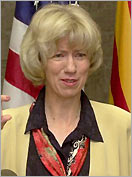
U.S. Interior Secretary
Gale Norton
AP
|
|
FOX NEWS CHANNEL > POLITICS
WASHINGTON ó After nearly a decade of spoiled records, lost money and three
Cabinet secretaries cited for contempt of court, lawmakers are saying the Bureau of
Indian Affairs under the Department of Interior has lost its credibility with Native
Americans.
|
"This borders on a national scandal," said Sen. John McCain, R-Ariz., who told
Deputy Secretary of the Interior James Casson on Tuesday that "there is a lack of
credibility on the part of the bureau to carry out its responsibilities."
McCain was speaking during a Senate Indian Affairs Committee oversight
hearing of Indian Trusts. That's where two former Special Trustees of the Bureau
of Indian Affairs testified that an inefficient, stagnant bureaucracy has caused
the problems and that no reform was going to occur, unless a separate, independent
agency is established to handle the fiduciary responsibilities of the trust and
any future settlement to the plaintiffs and other aggrieved property owners.
"You canít institutionalize reform, when more, than half of your management
is incompetent and needs to be retrained," said Paul Homan, who served 1995-1999
as Special Trustee for the trust. Homan said he resigned out of frustration, because
he lacked the authority and independence to carry out reforms required by the 1994
American Indian Trust Fund Reform Act.
"I think [the bureau] is still lacking the will to get the job done," added
Thomas Slonaker, who served briefly under the Clinton administration as Special
Trustee in 2000 and then under the current administration, until Norton asked him
to resign this summer. He said he experienced the same frustrations as his predecessor.
Their assertions are not without backing. Earlier this month, U.S. District
Court Judge Royce Lamberth charged Interior Secretary Gale Norton with contempt of
court for failing to fix the Indian trust fund system, which handles million of
dollars in Indian royalty payments dating back over 100 years.
She joins former President Clintonís Treasury Secretary Robert Rubin and
Interior Secretary Bruce Babbitt, who were found in contempt of court in 1999 over
the same case.
The case arose in 1996, when Indian groups sued the federal government,
charging that it owes Native American landowners at least $10 billion ó and in
some reports as much as $137 billion ó resulting from decades of massive
mismanagement of Indian trust accounts.
Since 1888 the Department of Interior has leased properties and processed
revenues from farming, drilling and other uses on Indian-owned lands, which number
in the tens of millions of acres across the country.
Tribes are supposed to have been getting royalties from those leases, but
the government has acknowledged major problems in administering the trust.
The Interior has spent close to $700 million, since the case was filed, to
comply with court and congressionally-ordered instructions to clean up its act, but
to no avail. Before being cited for contempt, Norton asked the judge for more time
to sort out the chaos she inherited, but Lamberth denied the request, saying Norton
not only failed to comply with his orders, but lied about the agencyís progress.
"Worse yet, the department has not undeniably shown that it can no longer be
trusted to state accurately the status of its trust reform efforts," said Lamberth,
who also ordered the agency to pay all of the plaintiff's attorney's fees and come
up with a new management structure for the trust.
On Tuesday Slonaker described a culture that was averse to change and one, in
which incompetent employees could not be fired, even after several court-mandated
reforms.
"Even the competent managers arenít trained in trust, they are not trust
managers," he said. "Itís going to take an outside agency to get it done."
But agency officials said that idea ó whether it be an outside agency or an
independent board on the inside ó has already been rejected by tribal leaders, who
fear a loss of control over the process.
"We need to try to work together with the beneficiaries," said Deputy Secretary
Casson, who felt the contempt order by Lamberth was "demoralizing" for the agency,
which is in the process of working with a task force of tribal leaders to hammer out
reform proposals.
The agency has also started a "historical accounting" of records, which could
take as long as five years, in order to start paying out settlements.
Any proposal tribal leaders agree to, however, is unlikely to include a separate
commission, said Danny Jordan, a spokesman for the Hoopa Valley Tribal Council in
California. He said most leaders would like to see the agency be given the proper
resources and institute more self-governing measures for property owners over their
piece of the trust.
He said they are not willing to throw the proverbial baby out with the bathwater
and leave the trust in the hands of outside bean counters.
"The Bureau of Indian Affairs is the most underfunded agency that exists. It
has been simply ignored for years," Jordan said. He added, "When you have an agency
that has been underfunded and beat up for so long, itís easy to say letís throw it out."
Whatever the course of action, it better take place soon, said Committee Chairman
Sen. Ben Nighthorse Campbell, who sympathized with the individual property owners, who
were owed compensation. "Weíve got to cut our losses and start cutting some checks,"
he said.
|
